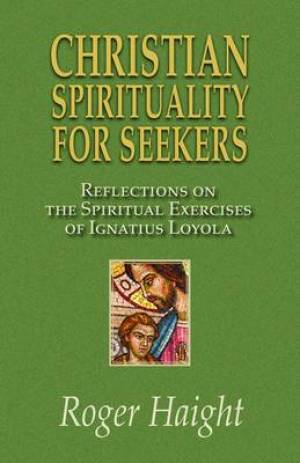Cambridge, MA. I was pleased to receive a copy the other day of a new book by Roger Haight, our esteemed and ever-creative fellow Jesuit, educator, theologian, and in recent years, insightful writer in the field of spirituality: Christian Spirituality for Seekers: Reflections on the Spiritual Exercises of Ignatius Loyola (Orbis Books, 2012) I will leave the project of a review to review writers – or wait until someone asks me to review it – but I wish to call your attention to this most interesting book. 
Christian Spirituality for Seekers is both a thoughtful study of the Exercises and how they came to be, and – in the distinctive dimension of the book – a forward-looking reflection on how the Exercises are a resource for the wider community of those seeking after God, wisdom, and spiritual wholeness. While it is at every point Christ-centered, with much of the text of the Exercises woven into the chapters, Fr. Haight also shows how the genius of Ignatius’ spiritual vision can be a guide for a broader spiritual community as well.
Interreligious understanding comes in many varieties and from many starting points, and this book, deeply grounded in the Exercises, deserves attention and will be appreciated by those who are thinking about our mission and witness to Christ in today's religiously diverse world. I know that it resonates well with my own early efforts to draw on the Exercises with Hindu and Buddhist students in Kathmandu in the early 1970s. In this space several years back I recalled that Fr. Adolfo Nicolás, our then new Jesuit General, mentioned favorably the use of the Exercises in adapted form in Japan today, in some of his first public comments as General. Fr. Haight is in a sense doing the same, closer to home, bringing the Exercises to the men and women right around us in our own cities.
Fr. Haight shared a version of the book with us at the Center for the Study of World Religions in the fall of 2011, and the video is here.







Most of the attempts to bring light to the exercises strike me as being weak and maybe serving the author's ideology than anything else.
Thanks for bringing this to my attention.
http://chiesa.espresso.repubblica.it/articolo/1337144?eng=y
This article is quite interesting.It has all of the central characters fighting over who Jesus was.Ratzinger,Martini, O Collins etc.
http://www.jesuit.org/jesuits/wp-content/uploads/Studies_Summer_2010.pdf
It may be beyond your doubt, but in truth there is a wide variety of opinion about Roger Haight's work in the Society of Jesus. I, and many of my Jesuit contemporaries, applaud what he is attempting in his Christology, for example, but are troubled by what he proposes. Similarly, I have been critical about some things he has written about the Exercises in the past, and will thus approach his current book with some skepticism. Nonetheless, I will read it because I have immense respect for him and admire his theological insight, even if I don't always agree with his conclusions. That said, I may have just contradicted myself, because that seems pretty "hospitable" to me.
I forgot to put those words in commas as they were taken from the article above.
My interest is if the Exercises can truly be made relevant to modern people or are just a relic of the past requiring a certain societal framework that no longer exists in the Western World to have an effect.
Will be interesting to follow.
http://chiesa.espresso.repubblica.it/articolo/1337144?eng=y
Here's a nice little bit from it:
You are very welcome.I find that website one of the most disturbing of all the catholic sites as the writer is pathologically political(italian trait!).But as you are learning Italian it would be good to read as they have most articles in both languages.
The comment about relevancy over orthodoxy could be inverted.Jesus is no longer relevant to people but the Church prides itself on maintaining orthodoxy.If St Paul or St Peter were alive today they would be utterly baffled at what theologians and the magisterium had done to the faith, Jesus Himself no doubt is stroking his beard with a look of bewilderment.